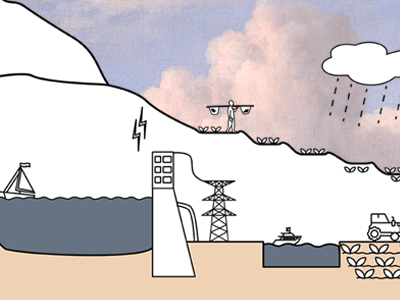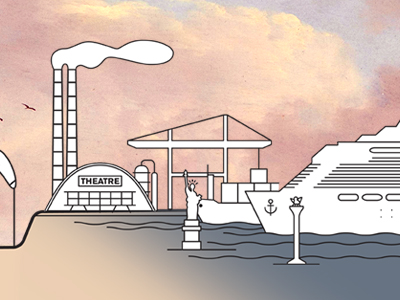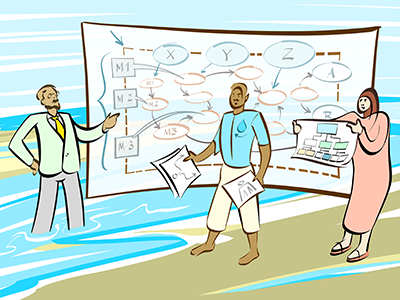Overview
Course video
Explore the design and management of water systems through analyzing the successes and failures of water systems of the past. Bring your own case to the course and apply what you have learned to your own context to ensure the long-term resilience of water systems in the light of the challenges of climate change.
Recent events and disasters have made water management professionals realize that the current application of technology and economic measures might not be sufficient in light of the challenges of climate change. Ensuring drinking water supply and irrigation while protecting against floods and droughts requires long-term thinking and a comprehensive approach. How can we learn from the spaces and practices of the past to improve current water systems design and common practices?
This innovative course offers a unique approach for water management specialists who want to think outside the box and move towards designing long-lasting, resilient and sustainable water systems.
The approach is built upon the following pillars:
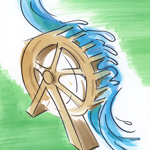 Learning from successes and failures of the past
Learning from successes and failures of the past
Many water systems of the past were sustainable. What can we learn from them? You will identify past interventions, both the good (irrigation systems, stepwells, polders for subsistence, etc.) and the bad (laws preventing equal access to water, polluting practices, dams destroying ecosystems, etc.) and apply them to a future design.
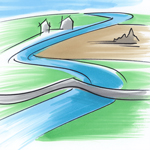 Increasing water awareness among diverse stakeholders
Increasing water awareness among diverse stakeholders
Realizing the role of water in our environment and our interaction with it (from objects to landscapes) can inspire you to develop new ways of thinking and innovations of water systems design, in line with the UN Sustainable Development Goals (SDGs).
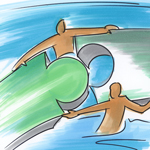 Designing future sustainable systems through value-based approaches
Designing future sustainable systems through value-based approaches
Recognizing spatial, social and cultural values is key to improving decision-making and engagement among water professionals and their stakeholders. You will find new ways to build coalitions and to design more sustainable solutions.
Real world examples and actionable steps will allow you to add a new angle to your approach and career in water. You will create your own value case, reviewed by the instructors, in which you recognize social and cultural values as integral to developing future water systems.
The course is presented by the UNESCO Chair Water, Ports and Historic Cities, established in the Leiden-Delft-Erasmus university consortium. The UN Sustainable Development Goals (SDGs) are at the core of this course, as a way to position heritage within present-day policy and practice.
The course is aimed at water professionals, which can include water managers, water activists, and those working in government and semi-government as well as those who have experience managing or analyzing water systems in a different professional context. The course is also suitable for professionals working on sustainable water development, because it is crucial to embed heritage sites and practices in future-oriented sustainable development.
What You'll Learn:
At the end of the course, you will be able to:
- Apply novel tools and methods integrating the past for designing complex water systems
- Challenge preconceptions and analyze how they influence our decisions for the future
- Conceptualize the UN SDGs as a comprehensive value system for water and heritage
- Use system analysis to raise water awareness and engage diverse stakeholders
- Design a value case that draws on the past to improve decision-making and promotes sustainable water development.
This course is brought to you by
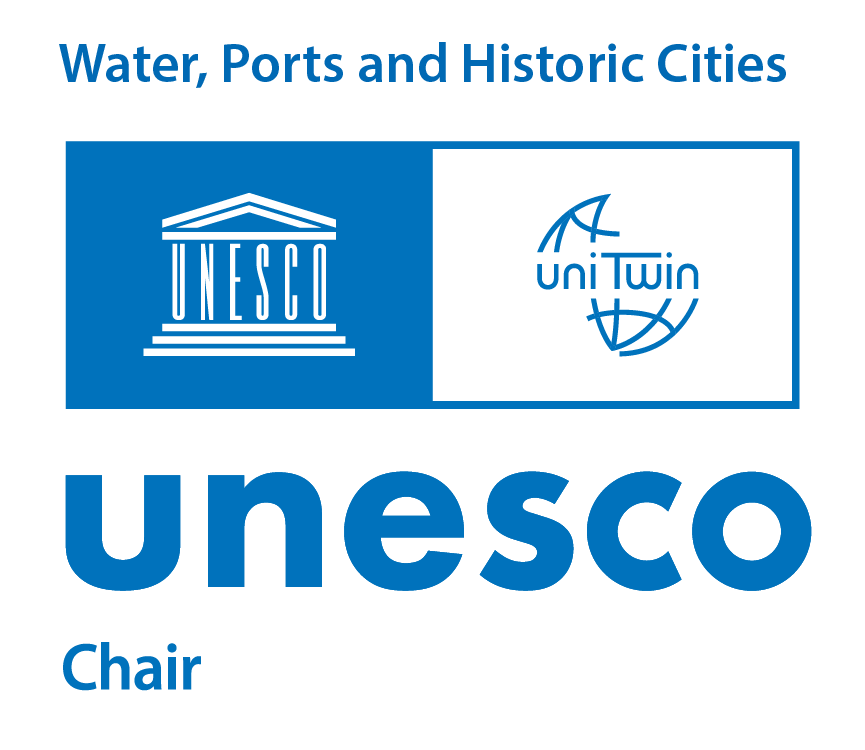
Details
Course Syllabus:
Week 1 – Water Heritage on the Agenda
In the first week, you will explore concepts of water and heritage and define your position on the role of heritage in contemporary water management.
We will introduce you to the world of heritage and invite you to reflect on your own experience. We will focus the discussion on recognizing and conceptualizing water and heritage, taking into account contemporary challenges of water management.
At the end of the week, you will develop a working definition of water heritage and relate it to a water system of your choice.
Week 2 – Connect Heritage to Landscape through Water
We will introduce you to the tool kit developed by the Water Museums Global Network to examine a water system as a container of past objects, sites, and practices.
In a mapping exercise, you will take a bird’s eye view and identify individual objects and practices that are, or could be, considered heritage. You will then learn a water heritage taxonomy that you can apply to recognize why these objects are valuable, and how they are connected to their context. This will help you understand the (added) value of these objects in connection to water systems.
Week 3 – Water Heritage: Who Cares? Stakeholder and System Analysis
In this week, we will introduce you to a canvas tool that will help you visualize how a water system is connected to its context. This will allow a systematic exploration of economic, material and social networks and their related values.
Analyzing a water system of your choice, you will create a simplified version of a canvas to identify vulnerabilities in your system and address opportunities for intervention.
Week 4 – Water Heritage and the UN SDGs for Sustainable Development
The UN Sustainable Development Goals (SDGs) connect present-day challenges to a variety of universal values. After listening to the Dutch Coordinator for SDGs, we introduce a systematic, value-based approach to sustainable development.
We will provide you with case studies that show how the past is relevant for sustainable future development. You will analyze the values present in your case study, and examine how preserving the past can help (or hinder) working towards the SDGs. In doing so, you are positioning your water work in its larger context of space and time, and leveraging it for sustainable development.
Week 5 – Making a Value Case for Water Heritage
By now, you have chosen at least one water system, identified its vulnerabilities, and analyzed the balance of values. In this final week, you develop an argument to integrate water heritage in a future project by drafting a value case. In this value case, you will weigh the tangible and intangible values of heritage as levers for sustainable development.
We will give you examples of how you can use heritage as a tool to raise water awareness among peers and with citizens. We invite you to reflect on sustainable development with heritage and to become an ambassador for an approach that brings the past to the future.
Qualifications
Certificates
If you successfully complete this course you will earn a professional education certificate and you are eligible to receive 2.5 Continuing Education Units (CEUs).
Admission
This course is primarily geared towards working professionals.
Prerequisites:
None.
Contact
If you have any questions about this course or the TU Delft online learning environment, please visit our Help & Support page.

